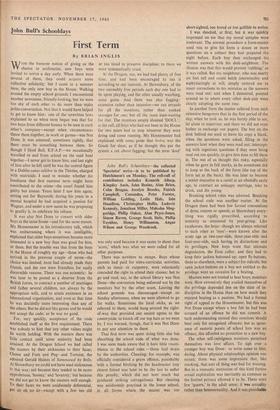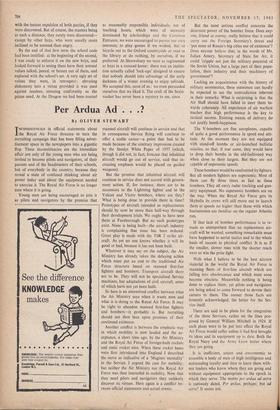John Bull's Schooldays
First Terni
By BRIAN INGLIS
WITH the humane notion of giving us the chance to acclimatise, new boys were invited to arrive a day early. When there were several of them, they could acquire some collective solidarity; but I came in a summer term, the only new boy in the House. Walking around the empty school grounds I encountered another newcomer, friendly-looking, but we were too shy of each other to do more than make Polite conversation. Not that it would have helped to get to know him : one of the unwritten laws explained to us when term began was that for two boys from different houses to be seen in each other's company—except when circumstances threw them together, in work or games—was Not Done. It was assumed, sometimes rightly, that there must he something between them. So though I liked Ball, E.F.A.P.—we occasionally travelled to and from school on the mail boat together—I never got to know him, and lost sight of him after he left until he was the central figure in a Dublin cause celebre in the Thirties, charged with matricide. I used to wonder whether his loneliness that first summer term might have contributed to the crime—the court found him guilty but insane. Years later I saw him again, setting out for Bayreuth; during his years in a mental hospital he had acquired a passion for Wagner, and under a new name he was proposing to gratify it, to celebrate his release.
It was also Not Done to consort with older boys in the same house—and for the same reason. My Housemaster in his introductory talk, which was embarrassing where it was intelligible, explained that older boys sometimes became more interested in a new boy than was good for him, or them. But the trouble was that from the boys in the House of roughly my age—those who had arrived in the previous couple of terms—the choice was limited; most had already made their friends, and the rest were friendless for easily discernible reasons. There was one eccentric: he was later to be posted as a deserter from the British forces, to contract a number of marriages and father several children, not always by the appropriate wife, and to attain eminence in an International organisation; and even at that time he was decidedly more interesting than any of the others. But he did not like games and he would not accept the code; so he was no good.
For, very quickly, acceptance of the code established itself as the first requirement. There Was nobody to hint that any other values might be worth holding. With the masters there was little contact until , some seniority had been attained. At the Dragon School we had called the masters by their nicknames to their faces; Cheese and Fuzz and Pug--and Tortoise, the admired Gerald Haines of Summoned by Bells. At Shrewsbury we could not have used nicknames In this way; not because they tended to be more opprobrious, 'hoosey,' and 'lavatory,' but because we did not get to know the masters well enough. To their faces we were assiduously deferential, Yes sir oh no sir—except with a few too old or too timid to preserve discipline; to them we were systematically cruel.
At the Dragon, too, we had had plenty of free time, and had been encouraged to use it according to our interests. At Shrewsbury, of the two ostensibly free periods each day one had to be spent playing, and the other usually watching, some game. And there was also fagging : extensive rather than intensive—we ran errands for all the monitors, rather than cooked sausages for one; but all the more time-wasting for that. The monitors simply shouted 'DOUL': at the call, all boys who had not been in the House for two years had to stop whatever they were doing and come running. My Housemaster had explained with some pride that 80-thkos was the Greek for slave, as if he thought this put the system a cut above fagging; but the term 'dour John Bull's Schooldays—the collected `Spectator' series—is to be published by Hutchinson's on Monday. The roll-call of contributors includes Kenneth Allsop, Kingsley Amis, John Brainc, Alan Brien, Colm Brogan, Jocelyn Brooke, Pafrick Campbell, Cassandra, Peter Forster, William Golding, Leslie Hale, lain Hamilton, Christopher Hollis, Ludovic Kennedy, Jonathan Miller, Malcolm Mug- geridge, Philip Oakes, Alan Pryce-Jones, Simon Raven, George Scott, Strix, Philip Toynbee, Henry Williamson, Angus Wilson and. George Woodcock.
was only used because it was easier to shout than `scum,' which was what we were called for all other purposes.
There was nowhere to escape. Boys whose parents had paid for extra-curricular activities, such as music or carpentry, were reluctantly conceded the right to attend their classes; but to go and read, say, in the school library was Not Done—the convention being enforced not by the monitors but by the other scum. Leaving the school grounds was discouraged—except on Sunday afternoons, when we were allowed to go for walks. Sometimes the local oicks, as we referred to them, would hang around the right- of-way that provided our easiest egress to the countryside, to knock off our top hats as we went by. I was warned, though, that it was Not Done to pay any attention to them.
That first term was spent doing little else but absorbing the school code of what was done. I was soon made aware that it bore little resem- blance to the school rules — those laid down by the authorities. Cheating; for example, was officially considered a grave offence, punishable 'with a formal birching by the headmaster (my closest friend was later to be the last to suffer this penalty, which did not hurt much but produced striking corrugations). But cheating was assiduously practised in the lower school, in all forms where the master was too short-sighted, too bored or too gullible to notice. I was shocked, at first; but it was quickly impressed on me that my moral scruples were irrelevant. The normal procedure a form-master used was to give his form a dozen or more questions on a subject they had prepared the night before. Each boy then exchanged his written answers with his desk-neighbour. The illusion was that this would prevent 'cabbing,' as it was called. But my neighbour, who was nearly six feet tall and could belch interminably and asphyxiatingly at will, simply ordered me to insert corrections to his mistakes as the answers were read out; and when I demurred, pointed around us to where every other desk-pair were clearly adopting the same ruse.
In another form the master suffered from such extensive hangovers that in the first period of the day, when he took us, he was barely able to see, let alone to supervise; and there we did not even bother to exchange our papers. The boy on the desk behind me used to leave his copy a blank, when the questions were asked, filling in the answers later when they were read out; interrupt- ing with ingenious questions if they were being read out too quickly, to give him time to fill them in. The rest of us thought this risky, especially when he gave in full marks, as he sometimes did to keep at the back of the form (the top of the form sat at the back). He was later to become a senior executive in a cartel at an absurdly early age, to contract an unhappy marriage, take to drink, and die young.
Breaking school rules was admired. Breaking the school code was another matter. At the Dragon there had been few formal conventions of dress, custom or speech; at Shrewsbury every- thing was rigidly prescribed, according to seniority as measured by year-group. Like racehorses, the boys—though we always referred to each other as `men'—were known after the scum age as two-year-olds, three-year-olds and four-year-olds, each having its distinctions and its privileges. New boys wore that ultimate degradation, the Eton collar, and they had to keep their jackets buttoned up; open fly-buttons, there as elsewhere, were a subject for ridicule, but open jacket-buttons on a boy not entitled to the privilege were an occasion for a beating.
Masters were not trusted to beat boys; monitors were. How extensively they availed themselves of the privilege depended less on the state of in- discipline in the House than on how much they enjoyed beating as a pastime. We had a formal right of appeal to the Housemaster, but this was Not Done except where a boy felt he had been accused of an offence he did not commit. A tacit understanding existed that monitors should beat only for recognised offences; but as ignor- ance of esoteric points of school lore was an offence, this afforded no protection to a new boy.
The other self-indulgence monitors permitted themselves was love affairs. To sigh over a younger boy was Done : to write notes to him, daring. About physical relationships opinion was mixed; there was some impression that, like smoking, that sort of thing was bad for training. But in a monastic institution of this kind furtive sexual exploration was inevitably as common as the limited privacy allowed it to be. There were few 'queers,' in the adult sense; it wes sexuality rather than homosexuality. And it was punishable with the instant expulsion of both parties, if they were discovered. But of course, the masters being at such a distance, they rarely were discovered— except by other boys, who were usually more inclined to be amused than angry.
By the end of that first term the school code had been instilled: at the beginning of the second, I was ready to enforce it on the new boys, and looked forward to seeing them have their normal values talked, jeered, or beaten out Of them, and replaced with the school's set. A very ugly set of values they were, in retrospect: elevating dishonesty into a virtue provided it was used against masters; stressing conformity as the prime need. At the Dragon we had been treated as reasonably responsible individuals; out of teaching hours, which were of necessity dominated by scholarships and the Common Entrance, we were encouraged to pursue our Ow n interests; to play games if we wished, but to bicycle out to the Oxford countryside or read in the library or do nothing, by ourselves, if we preferred. At Shrewsbury we were as regimented as boys in a remand home: there was an institu- tion actually called 'lock-ups' designed to ensure that nobody should take advantage of the early darkness of a winter evening to enjoy solitude. We accepted this, most of us: we even persuaded ourselves that we liked it. The craft of the brain- washer has never been a mystery to me, since.







































 Previous page
Previous page